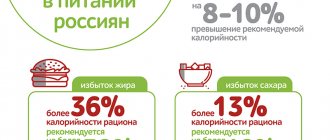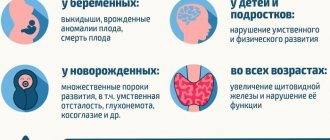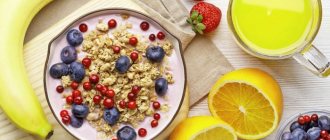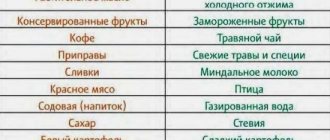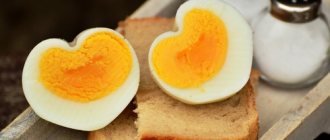Losing weight up to 7 kg in 14 days. The average daily calorie content is 1050 Kcal.
The Institute of Nutrition of the Russian Academy of Medical Sciences (RAMS) has existed for almost 90 years. During this time, his employees helped improve nutrition and reduce weight for a huge number of people.
The weight loss method proposed by the institute’s scientists is successfully used in stationary conditions under the supervision of experienced specialists and by people independently at home. The Institute of Nutrition diet is aimed at gradual, proper weight loss. It is scientifically proven, which means it is as harmless to health as possible.
Diet requirements of the Institute of Nutrition of the Russian Academy of Medical Sciences
The diet rules of the Institute of Nutrition do not require strict restriction of calorie intake. For those who want to lose weight, the developers of the method advise to gradually reduce this figure to 1300-1800 calories per day. If your weight is initially noticeably large, and you realize that you previously consumed significantly more calories, then you should reduce your calorie intake even more gradually. This will minimize the risk of problems with the body and the possibility of breaking the diet.
The Institute of Nutrition promotes the establishment of a low-fat, balanced diet, the basic principles of which can be adhered to for a very long time (even throughout life). In the first place in creating a menu are foods rich in healthy fiber, that is, vegetables and fruits. They have an excellent effect on the functioning of the gastrointestinal tract, contain few calories and satisfy hunger well. In second place were products with a high protein content of animal origin - lean fish, lean meat, and various seafood. And in third place are foods with a low glycemic index - cereals.
The diet of the Institute of Nutrition does not require a clear menu. Taking into account the recommendations described above, you can create it yourself, taking into account your personal taste preferences, financial capabilities and lifestyle.
In more detail, the lists of foods and dishes recommended for the most frequent consumption include: - any vegetables in fresh, stewed, boiled or steamed form, as well as as part of empty salads (but the author of the methodology recommends placing the main emphasis on white cabbage and cauliflower, and also on other vegetable products that contain a minimal amount of starch); - low-fat or low-fat kefir, cottage cheese, chicken breast, skinless turkey, lean beef, chicken eggs, fish, shellfish, squid, shrimp; - various unsweetened berries, apples (preferably green), melons.
It is important to observe moderation when eating. The ideal diet is fractional five meals a day. The weight of each meal should not exceed 200-250 g. You may feel a little hungry after eating at the beginning of the diet. But, as experienced losers say, you need to endure a little, and the desire to “kill the worm” will recede, and soon this eating schedule will become comfortable for you. Salting food is allowed, but salt should be consumed in moderation (no more than 5 g per day). It is also important to maintain a water regime and consume 1.5-2 liters of pure water per day.
To speed up the weight loss process, try to lead as active a lifestyle as possible. Walk more, go to the gym, or exercise at home. This will not only help you get rid of those annoying pounds faster, but will also make your body attractive and fit.
It is recommended to follow the strict diet of the Institute of Nutrition for 14 to 21 days. If you are noticeably overweight, 7-10 (or even more) extra kilograms may “run away” from you during this time. After this, you should slightly increase the calorie content of your food and monitor your weight. If you are satisfied with it, increase your caloric intake until the scale needle stabilizes at the desired level. And if you want to lose weight further, then remove some calories. Weight will decrease more smoothly, but, most importantly, weight loss will proceed at a healthy pace for the body and will not cause damage to health.
Once you reach your desired physical shape, you can basically consume whatever you want. But it is still better to minimize the presence in the diet of various confectionery products, white bread, pasta made from soft flour, sweet soda, smoked meats, lard, fast food, margarine and other cooking fats. After all, they obviously will not bring benefits to both the figure and the body.
To achieve the desired results in weight loss, fast carbohydrates and foods with a high glycemic index should be excluded from the diet. Sugar, pastries, cakes, pastries and other confectionery products, as well as potatoes and bananas containing starch, are prohibited. It is not recommended to consume grapes, which have a high calorie content due to their natural fructose content.
In the first couple of weeks, porridge should be excluded from the diet; it is allowed to consume a tablespoon of vegetable oil, lean meat, such as chicken, as well as turkey and veal. Fish must be lean, such as pike perch, cod, crucian carp, pike, hake, mullet, lemonema, pangasius, flounder and other species.
To supply the body with calcium, it is necessary to consume fermented milk products with a fat content of 2-5%: yoghurts without food additives, kefir, cottage cheese, milk. Fiber is important to maintain bowel function, so include a variety of non-starchy vegetables in your diet. These include: green peas, white cabbage, broccoli, kohlrabi, asparagus, onions, tomatoes, celery, cucumbers, Brussels sprouts, sweet peppers, as well as sorrel, parsley, dill, chicory, mustard, lettuce and other greens.
You can eat berries in unlimited quantities, they are especially useful for snacking, for example, blackberries, blueberries, cranberries, currants. But citrus fruits are allowed in small quantities.
During the diet, black, green, herbal unsweetened teas, decoctions, chicory, fruit drinks, freshly squeezed fruits and vegetables are allowed. It is advisable to limit or eliminate coffee consumption.
To achieve good results in losing weight, you must strictly follow the diet rules:
- 5-6 meals a day, one meal should be about 250 g;
- no more than 1.5 liters of water per day, that is, the drinking regime should be limited, since the liquid that is contained in the foods consumed is considered;
- do not make sharp dietary restrictions; the calorie content of food at the level of 1800 kcal is sufficient for gradual weight loss, subject to active sports and for people engaged in heavy physical labor;
- when leading a sedentary lifestyle, it is necessary to provide food not exceeding 1300 kcal, take brisk walks every day;
- gradual reduction in calorie content of food to 1300-1800 kcal to avoid breakdowns; it is recommended to reduce the diet by 50-100 g every day;
- exclude unhealthy fats and fried foods from the diet;
- the predominant share in the menu should be vegetables and fruits, then protein foods and the smallest percentage should be cereals;
- limit the amount of salt to 1 teaspoon per day; if the menu contains pickles and other salt-containing products, then the amount of pure salt should be reduced;
- eliminate almost all sugar.
The first half of the day accounts for a larger volume of daily calorie intake, approximately 2/3 of the diet, and leave the rest of the food for afternoon snacks and dinner. Sweet foods containing higher amounts of carbohydrates should be consumed in the morning to burn off energy throughout the day.
It is important to drink home-made drinks and not drink store-bought sodas, which contain a high proportion of sugar. Freshly prepared fresh juices, juices, herbal, black, green teas, berry compotes, fruit drinks are perfect, but they should not completely replace clean water.
Dinner should contain a small amount of calories and be easy to digest. The last meal is advisable three hours before bedtime; it can be kefir, green apples and other unsweetened fruits, low-fat yogurt, cottage cheese.
With a calorie deficit in the diet, vitamin and mineral deficiencies may occur. To avoid the negative impact of a lack of nutrients, you should use vitamin complexes containing vitamin A, group B, C, D, E and others. Daily walks and physical activity should be added to a low-calorie diet, which will speed up the weight loss process.
An example of a nutrition institute diet menu for 4 days
Day 1
Breakfast: 100 g boiled chicken fillet; 2 tbsp. l. green peas; a cup of black tea. Second breakfast: 50 g low-fat cottage cheese; green apple baked with cinnamon. Lunch: a bowl of soup cooked in vegetable broth; salad from non-starchy vegetables; a slice of fish, boiled or baked; a glass of fruit compote. Afternoon snack: a glass of rosehip infusion. Dinner: low-fat cottage cheese (180-200 g) and a cup of tea.
Day 2
Breakfast: steam omelette of 2 chicken eggs; 2-3 tbsp. l. salad of white cabbage, carrots and various greens; tea or coffee (you can add a little skim milk to the drink). Second breakfast: 100 g of low-fat cottage cheese and a glass of fruit juice. Lunch: a serving of vegetable puree soup; fish stewed in the company of non-starchy vegetables; a glass of berry juice. Afternoon snack: a glass of low-fat milk and 2-3 pcs. biscuits or other low-calorie cookies. Dinner: pasta with mushrooms; a cup of green tea.
Day 3
Breakfast: 100 g of any lean meat, boiled or fried in a dry frying pan; a slice of bran bread with lettuce leaves; Black tea. Second breakfast: fruit salad. Lunch: bowls of cabbage soup cooked in lean meat broth; up to 100 g of cooked meat; cucumber-cabbage salad; a glass of compote. Afternoon snack: a cup of black tea and a marshmallow. Dinner: 2 whole grain toasts with low-fat cheese; tea.
Day 4
Breakfast: unsweetened muesli or oatmeal cooked in water; toast made from rye bread and a piece of low-fat cheese or a small amount of cottage cheese; tomato; Cup of tea. Second breakfast: apple (can be baked); bread with cheese; a cup of tea or coffee. Lunch: fish soup and 2-3 tbsp. l. vegetable stew. Afternoon snack: pear and a glass of any fruit juice. Dinner: 100 g chicken breast, boiled or baked; whole grain bread; lettuce leaves; tea, maybe with milk added.
Basic knowledge about healthy nutrition
A rational approach to nutrition was formulated back in Soviet times and presented by the famous biochemist A. A. Pokrovsky. His scientific discoveries are still used to this day at the Institute of Nutrition of the Russian Academy of Medical Sciences. The principles are as follows:
- energy balance;
- balance of substances;
- stable diet;
- correct distribution of calories.
Let's take a closer look at each of the points. Regarding the first, the point here is that a person must have a balance in energy consumption and expenditure. For example, if there is a constant calorie surplus with insufficient physical activity, then all this leads to a gradual increase in body weight through the accumulation of fatty tissue. If the situation is the opposite - heavy physical activity with poor nutrition, then this leads to exhaustion of the body and a decrease in muscle mass.
Regarding the balance of substances, it is worth saying that rational nutrition provides for the intake of all vital substances into the body:
- proteins, fats (animal and vegetable), carbohydrates (simple and complex);
- vitamins (groups A, B, C, D, E, K);
- minerals (iron, phosphorus, zinc, iodine, calcium, magnesium and others).
The next point is a stable diet. There should be at least 4 meals per day, in which calories will be optimally distributed. If you play sports and also have physical activity during the day, then you should eat even more meals. The optimal time between meals is 3-4 hours. You can’t do exercises or go to bed on an empty stomach.
As for the correct distribution of calories, they should be divided so that the first half of the day accounts for most of them, while the evening should not account for more than 350 calories. This is necessary so as not to overload the body at night, forcing it to waste energy on digesting large amounts of food at night instead of resting.
Nutritionists recommend distributing calories as follows:
- women need to consume 1800-3500 calories per day;
- men – 2100-4000 calories per day.
The exact norms depend on age, weight, intensity of physical activity and nutritional goals (weight loss, weight gain). If you need to achieve weight loss, then the reduction in calories must be done gradually and reduced by 500 calories every 3 weeks. On average, a person needs to consume about 60-100 g of protein, 50-120 g of fat, 250-500 g of carbohydrates per day. Exact proportions are calculated using special dietary formulas.
Advantages of the diet
- The Institute of Nutrition diet has many advantages. Unlike many other weight loss methods, it allows you to leave a large number of your favorite foods in your diet and feel quite free when creating a diet. There is no need to strictly follow a certain menu, being afraid to deviate from it.
- The diet of the Institute of Nutrition allows you to correctly rebuild the body's metabolic processes, thereby launching the natural mechanism for burning excess fat.
- You can lose weight without an acute feeling of hunger, without depriving your body of beneficial components and without compromising its basic needs.
- It’s also good that this diet accustoms us to proper nutrition, which increases the likelihood of maintaining our figure after losing weight.
- As a rule, eating according to the formula proposed by the institute allows you not only to transform your figure, but also to improve your health, and also make chronic diseases, if any, less noticeable.
- This type of nutrition helps you feel better and have good spirits.
The main points of the diet of the Institute of Russian Academy of Medical Sciences
When creating an individual diet for weight loss, you can use the basics of some diet rules developed by scientists and doctors at the Institute of Nutrition:
- There is no need to make strict restrictions; it is enough just to reduce the calorie content of food to 1800 Kcal per day. This indicator is suitable for those people who lead an active lifestyle, but with physical inactivity it will be enough to consume foods that will provide the body with 1300 Kcal per day.
- You need to reduce the caloric content of food smoothly and gradually. Only in this case will it be possible to avoid gastronomic breakdowns and problems in the digestive system. If there is too much excess weight, then the menu adjustment should be as slow as possible; it is recommended to reduce portions by 50 - 100 g per day.
- Doctors at the Institute of Nutrition advise following a low-fat diet that you can stick to throughout your life. Scientists distributed the products as follows: vegetables and fruits are in first place, protein foods (meat, fish and milk with derivatives) are in second place, and cereals are in third place.
- It is very important to eat small meals, at least 5 times a day. During one meal, it is allowed to consume no more than 250 g of food, which in the first days leads to a feeling of hunger and a desire to “snack something.” But if you wait 3-5 days, the body will get used to this regime and the discomfort will disappear.
- It is not at all necessary to give up salt, but its amount in dishes should be limited. The same applies to sugar, although it could be excluded from the menu.
- The diet should be followed for 21 days, then you can gradually increase the caloric content of food. You can’t get carried away with sweets and baked goods, you can’t relax - you can keep your weight at the desired level only if you eat a balanced diet.
Doctors say that without physical activity it is unlikely that you will lose weight even if you strictly follow a diet. Walking (at a fast pace) should be present in a person’s life; morning exercises are the minimum!
And one more important point is the daily routine. The human body is designed in such a way that it should sleep at night, receive a hearty breakfast in the morning, a mid-calorie lunch during the day, and a light, unobtrusive dinner. It is highly advisable to eat at the same time and drink at least one and a half liters of clean water per day.
We recommend reading about the Pevzner diet. You will learn about the basics of therapeutic diets (table 4 and 5), menu options, sample menus for the week, delicious and healthy recipes. Read more about the Mediterranean diet here.
The second law of healthy eating
The chemical composition of a person’s daily diet must correspond to his physiological needs for nutritional and biologically active substances. Vitamins and minerals are often called micronutrients
because the daily amounts required by the body are quite small and are most often measured in milligrams or even fractions of a milligram.
The human body cannot produce these substances on its own and store them for future use for any long period of time. For normal functioning, the human body requires several hundred different micronutrients
- these are vitamins and minerals, as well as many biologically active substances from other groups. Micronutrients are found in a wide variety of foods, and different ones in different foods. Therefore, for the normal functioning of your body, include in your diet fruits and vegetables, and always grain products, and other products of plant origin, meat, and dairy products.
